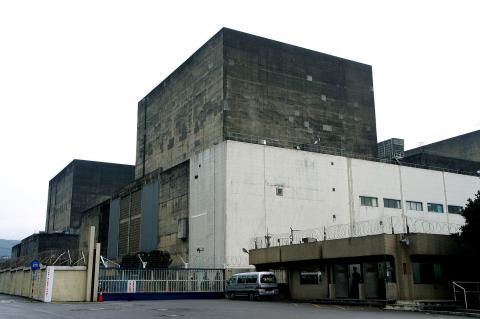North Korea has filed a transnational lawsuit against Taiwan Power Co (Taipower, 台電), accusing the state-owned utility of failing to honor a contract to deliver nuclear waste for disposal in the communist state, a local magazine reported.
The Chinese-language TVBS Weekly said in its latest issue yesterday that Taipower and the Pyongyang government signed a contract in 1996 that North Korea would take in the company’s nuclear waste.
However, because of international pressure — especially from the South Korean and US governments — Taipower called for a temporary suspension of the agreement in 1998, but later signed a new US$8.72 million deal with the North Korean government to extend the contract by five years, the report said.

Photo: EPA
Under the new deal, North Korea would continue investing and constructing nuclear waste disposal sites. However, since Taipower has not followed up on the deal, Pyongyang filed a transnational lawsuit against Taipower and asked for NT$300 million (US$10.1 million) in compensation, the report said.
Taipower issued a statement last night saying it did sign a contract with the North Korean government in 1997, promising to deliver low-level radioactive waste to the country for final management.
However, the two parties ran into difficulties that prevented them from carrying out the terms of the contract, Taipower said.
Taipower said that as of yesterday, it had not received any document stating that Pyongyang was seeking compensation for breach of contract.
The state utility said it was planning to deliver 60,000 barrels of low-level radioactive waste to a then-existing and still operating disposal site in North Korea, as promised in the contract signed on Jan. 11, 1997.
After the contract was signed, North Korea issued a permit allowing Taipower to export nuclear waste to the country.
However, North Korea failed to meet Taiwan’s Atomic Energy Council’s request that it follow the Taiwanese government’s rule of “finishing construction first prior to a site evaluation.”
Taipower also failed to obtain a permit from the AEC to export nuclear waste overseas.
Taipower added that the North Korean government had once sought mediation in 2004 from the AEC, but the two sides failed to reach a consensus.
The company said it did not wire any payment to the North Korean government because the contract never went into effect and had become invalid.

DAREDEVIL: Honnold said it had always been a dream of his to climb Taipei 101, while a Netflix producer said the skyscraper was ‘a real icon of this country’ US climber Alex Honnold yesterday took on Taiwan’s tallest building, becoming the first person to scale Taipei 101 without a rope, harness or safety net. Hundreds of spectators gathered at the base of the 101-story skyscraper to watch Honnold, 40, embark on his daredevil feat, which was also broadcast live on Netflix. Dressed in a red T-shirt and yellow custom-made climbing shoes, Honnold swiftly moved up the southeast face of the glass and steel building. At one point, he stepped onto a platform midway up to wave down at fans and onlookers who were taking photos. People watching from inside

A Vietnamese migrant worker yesterday won NT$12 million (US$379,627) on a Lunar New Year scratch card in Kaohsiung as part of Taiwan Lottery Co’s (台灣彩券) “NT$12 Million Grand Fortune” (1200萬大吉利) game. The man was the first top-prize winner of the new game launched on Jan. 6 to mark the Lunar New Year. Three Vietnamese migrant workers visited a Taiwan Lottery shop on Xinyue Street in Kaohsiung’s Gangshan District (崗山), a store representative said. The player bought multiple tickets and, after winning nothing, held the final lottery ticket in one hand and rubbed the store’s statue of the Maitreya Buddha’s belly with the other,

‘NATO-PLUS’: ‘Our strategic partners in the Indo-Pacific are facing increasing aggression by the Chinese Communist Party,’ US Representative Rob Wittman said The US House of Representatives on Monday released its version of the Consolidated Appropriations Act, which includes US$1.15 billion to support security cooperation with Taiwan. The omnibus act, covering US$1.2 trillion of spending, allocates US$1 billion for the Taiwan Security Cooperation Initiative, as well as US$150 million for the replacement of defense articles and reimbursement of defense services provided to Taiwan. The fund allocations were based on the US National Defense Authorization Act for fiscal 2026 that was passed by the US Congress last month and authorized up to US$1 billion to the US Defense Security Cooperation Agency in support of the

‘COMMITTED TO DETERRENCE’: Washington would stand by its allies, but it can only help as much as countries help themselves, Raymond Greene said The US is committed to deterrence in the first island chain, but it should not bear the burden alone, as “freedom is not free,” American Institute in Taiwan Director Raymond Greene said in a speech at the Institute for National Defense and Security Research’s “Strengthening Resilience: Defense as the Engine of Development” seminar in Taipei yesterday. In the speech, titled “Investing Together and a Secure and Prosperous Future,” Greene highlighted the contributions of US President Donald Trump’s administration to Taiwan’s defense efforts, including the establishment of supply chains for drones and autonomous systems, offers of security assistance and the expansion of